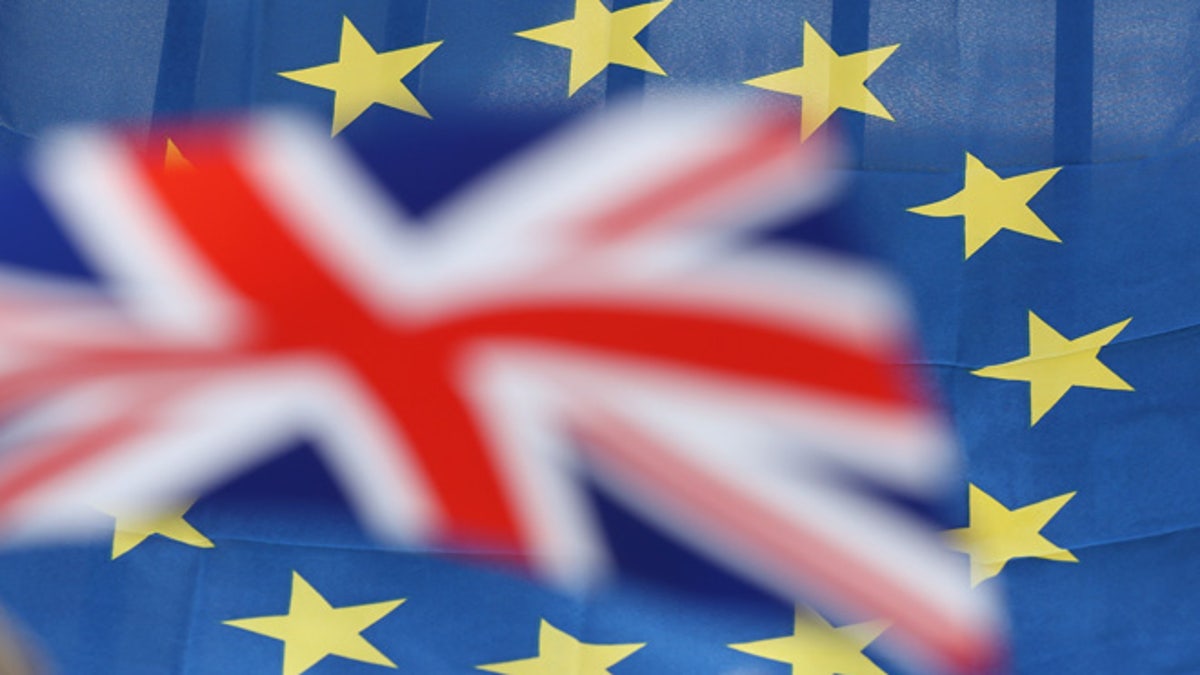
GIBRALTAR - JUNE 22: British and European Union flags hang in the city center the day before the EU Referendum on June 22, 2016 in Gibraltar. Citizens of the United Kingdom and its territories will go to the polls tomorrow in what many expect to be a very tight vote on whether to remain in or leave the European Union. A result is expected early Friday morning. (Photo by Sean Gallup/Getty Images) (2016 Getty Images)
The United Kingdom’s vote to leave the European Union complicates the situation of both political entities with certain overseas territories and nations in the Western Hemisphere as both struggle to make sense of what the so-called "Brexit" means for disputed territorial claims, trade agreements and other treaties, experts say.
“Everybody is scrambling to figure out what this means,” Chris Sabatini, a professor at Columbia University's School of International and Public Affairs, told Fox News Latino. Not least among them whomever replaces now former British Prime Minister David Cameron, who resigned as a result of the vote to separate from Europe.
In Latin America, countries are scrambling to deal with the financial downturn on the global markets that the Brexit is expected to cause.
Mexico announced on Friday that it will cut public spending by more than $1.6 billion in response to the economic uncertainty. Treasury Secretary Luis Videgaray said in a news conference that the year's second cut to public spending is being made to reduce the public sector's financing demands.
Brazil's central bank, on the other hand, said it has enough foreign reserves to handle possible cash outflows caused by the Brexit. Sao Paulo's stock exchange had fallen at midday Friday more than 3 percent due to result of the referendum.
For the European Union, one of the major concerns is in regards to the Brexit and will it give potential trade partners cold feet – or worse, cause current trade partners to pull out of their deals.
Chile and Mexico are currently the only two Latin American nations that have free trade agreements with the E.U. right now, but he Central American nations along with Colombia and Peru have agreements provisionally applied and the Mercosur nations of the Southern Cone and Ecuador are currently negotiating a deal with Europe.
“Does the Brexit make the E.U. less attractive to these nations?” Sabatini asked. “It possibly does. How do you sell a trade agreement to your congress when one of the biggest powers in the world has just pulled out of the E.U.?”
For the United Kingdom, one of the biggest questions is what – if anything – will happen with the disputed Falkland Islands.
Just hours before polls closed in Great Britain on Thursday, Argentina’s foreign minister Susana Malcorra told the United Nations that the country wanted to resolve its long-running dispute over the islands through negotiation.
Arguing that the sovereignty of the Falklands – which are known as the Islas Malvinas in Argentina – is a "permanent and unrelinquished" objective for the country, Malcorra told the U.N.’s Special Committee on Decolonization that the concept of self-determination did not apply in the case of the islands because the people living there moved there after the U.K. seized the islands in 1833.
"The passing of time has not eroded the validity of our claim, nor the strength of our conviction that this protracted sovereignty dispute must be solved through negotiations between the two parties involved,” she said, according to Forces TV.
A 2013 referendum on the Falklands, however, saw 99.8 percent of the 3,000 or so islanders vote to keep their current status as a British overseas territory.
"Falkland Islanders are comfortable with the constitutional relationship we have with the United Kingdom," Mike Summers, a member of the Falklands' Legislative Assembly, told the U.N., according to Voice of America. "We have a right to move away from it if we so wished, but there is no current wish to do so."
While the dispute with Argentina over the islands has been a constant source of tension between the two nations – they even went to war over them in 1982 – experts say that it will not be a top priority for the U.K. in the near future as it works to separate itself from the rest of Europe and select a new prime minister.
“Britain’s attention right now will be more focused on untangling itself from the E.U.,” Sabatini said.
The Associated Press contributed to this report.
